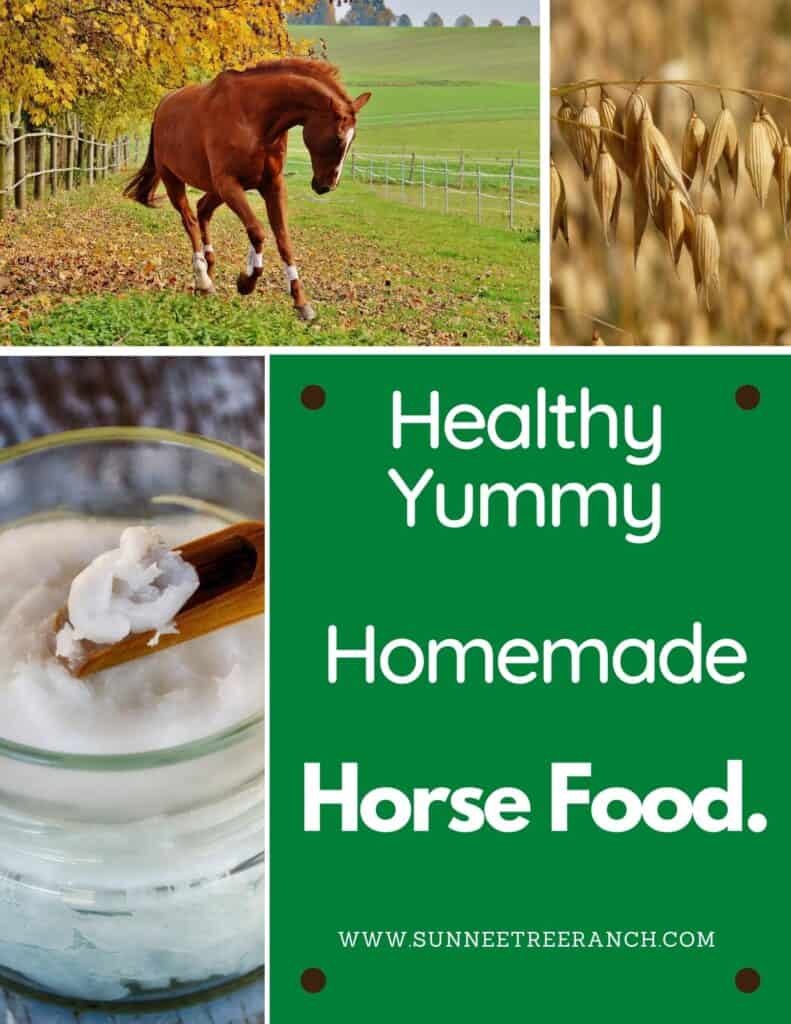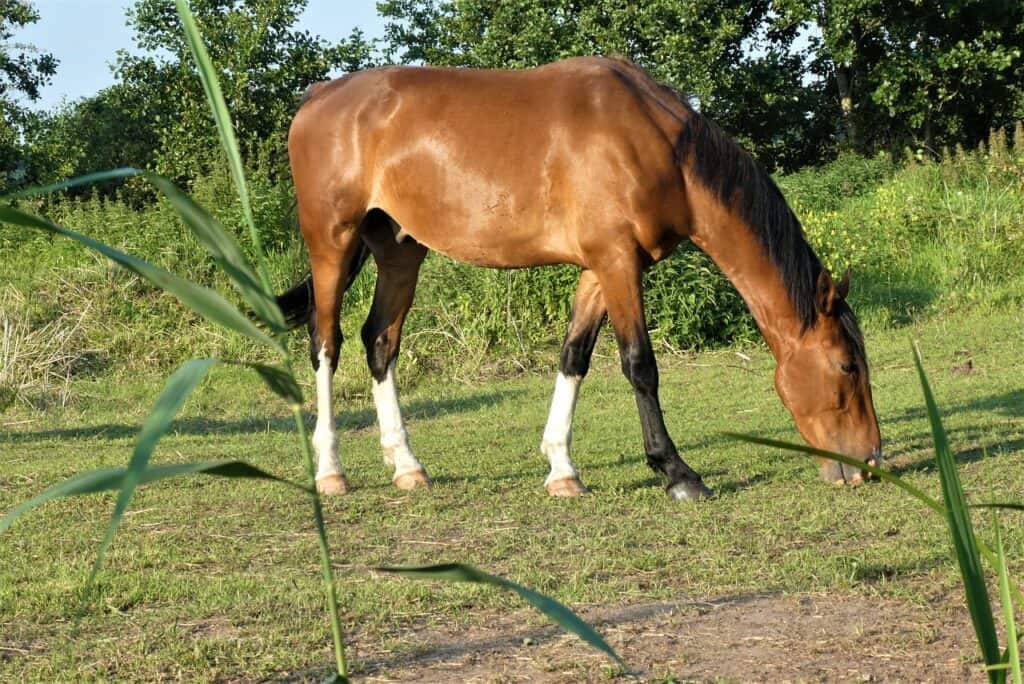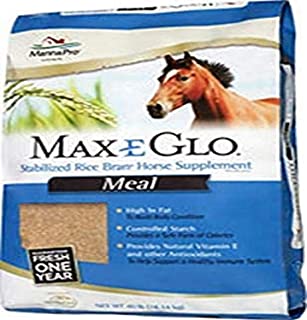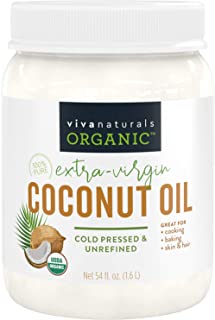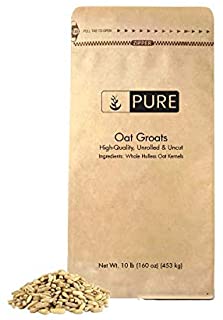The Beginners Guide DIY Horse Grain
- The Following ingredients make fantastic horse feed for your horses.
- This mixture has natural ingredients and none of the sugars and preservatives found in commercial grains. This article tells you all about what we would give a horse. Our Scooby loves this.
Alfalfa Pellets
- Alfalfa Pellets: Use this as my base. What better to use than forage? Alfalfa is best fed in small quantities anyway, so it makes a great pellet base for your feed. Most horses lack protein in a forage based diet; the alfalfa fills that gap. If your horse has a nice-sized belly but is ribby with no topline, it means they need more protein in their diet. The high calcium levels in alfalfa is also key to balancing out the phosphorous in your rice bran (see below).
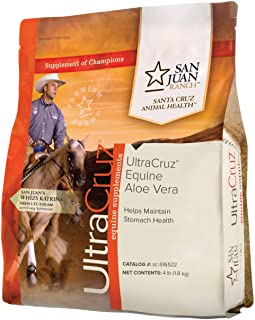
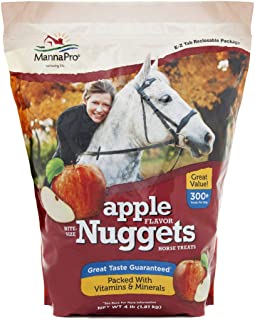
Rice Bran
- Rice Bran: This is an excellent source of energy, vitamin B-6, potassium, fiber, phosphorus and magnesium. It also contains gamma oryzanol, a naturally occurring “antioxidant” which helps to protect cell membranes from damage that can occur during strenuous exercise. Stabilized rice bran is a safe, palatable means of adding calories to the diet.
Whole Fax Seed
- Whole Flax Seed: Flax seed is high in omega-3 fatty acids and enhances overall health in horses. It can help reduce inflammation, which can relieve symptoms associated with sweet itch and other skin conditions. It can also alleviate symptoms of allergies. It also boosts the immune system and can help regulate thyroid function, making it an ideal supplement for metabolic horses as well as aging horses. It is best to feed these little guys whole. The nutrients start degrading as soon as they are touched by light and oxygen, so by the time you’ve ground them and dumped them in the feed pan, they have already lost nutrients. Even though some whole seeds may appear in the manure, the majority of them are used completely in the equine digestive tract.
Coconut Oil
- Coconut Oil: Lets be honest, coconut is the best for everyone, I cook with it every chance I get, it so good for humans and yep animals too. Most oil users use vegetable oil in their feed. Horses in general don’t get enough fat in their diet, which is why most owners turn to oils. But which oil is the best? Vegetable oil is the most common simply for the cheap cost. Essential fatty acids are contained in most vegetable oils but are often damaged by refining and processing or destroyed by free radicals. A diet rich in coconut oil can enhance the efficiency of essential fatty acids by as much as 100%. Be sure to choose a pure organic coconut oil.
Apple Cider Vinager
- Apple Cider Vinegar: Not only is this great for so many reasons on us humans, But…. This stuff has all kinds of great things for horses! Healthy joints, an anti-inflammatory for arthritis, a de-toxifier, an aide for digestion and gastric upset, and antibacterial properties just to name a few.
Whole Oats
Whole Oats: You need the intact kernel in order to receive the fat content of the whole grain. The husk of the whole oat is very important for correct chewing and digestive processes. A horse with good teeth and proper dental care will chew and digest the whole oat, leaving only husks in the manure. Oats have 90% starch digestibility, compared to corn which has around 30-35%. So when oats are fed in appropriate amounts, they are easily broken down in the small intestine and the enzymatic processes are not disturbed. There are also amazing benefits to the horse’s hoof growth! However oats are not a one size fits all.
Side Note: Choosing a Type of Oat
The type of oat you choose for your horse depends on his needs. If you lack the knowledge, ability or motivation to properly monitor and supplement your horse’s vitamin and mineral intake and needs, you should look for a complete grain product that contains oats as a primary ingredient. These feeds provide oats plus a mix of vitamins, minerals, corns and other ingredients. If you’re willing and able to adequately supplement your horse’s diet, choose a type of oat based on your horse’s needs. Hulled oats are the most nutritionally rich and digestible option. You’ll need to feed fewer hulled oats than other types of oats because the nutritionally lacking husks are not included in hulled oats. Rolled, crimped and crushed oats are similar in terms of digestibility and nutrition, but your horse may have a preference when it comes to texture and taste. Some horses simply like one type of oat more than the others. Whole oats, which still have their husks, can also pose a problem for older horses or those with dental issues.
Whole Fax Seed
Vitamins & Minerals: To ensure that my horse is also receiving the proper vitamins and minerals, I also provide my horses a block of Purina Free Balance 12:12 along with a small salt block in their pasture.
Every horse is different, so do your research and adjust your levels based on your horse’s needs.

